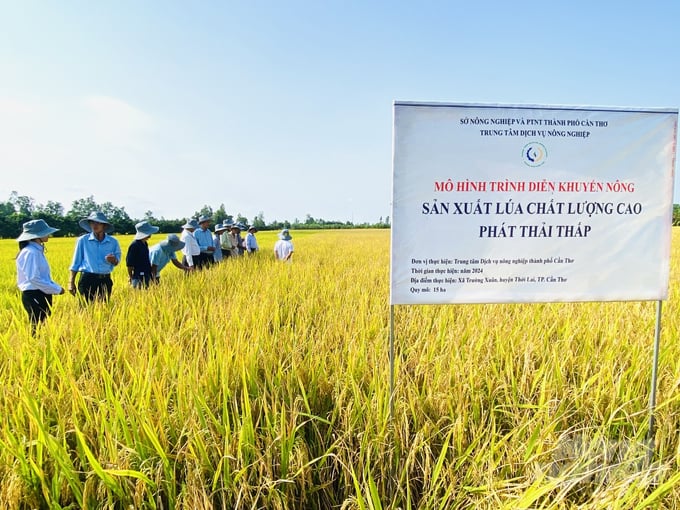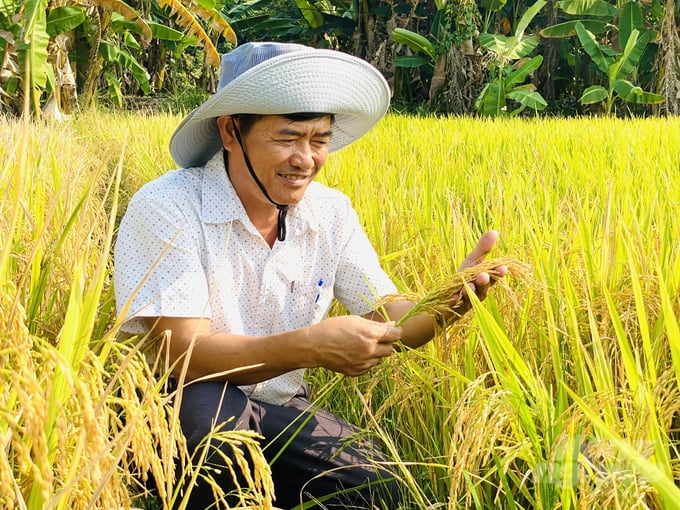November 27, 2025 | 20:51 GMT +7
November 27, 2025 | 20:51 GMT +7
Hotline: 0913.378.918
November 27, 2025 | 20:51 GMT +7
Hotline: 0913.378.918
On February 13, the Can Tho City Agricultural Service Center organizes a summary of the model of high-quality, low-emission rice cultivation in the 2024 - 2025 winter-spring rice crop in Thoi Lai district.
This model is under the “Scheme on Sustainable Development of 1 million ha of high-quality, low-emission rice cultivation associated with green growth in the Mekong Delta region by 2030.” It is implemented on an area of 6 ha at Tran Van Doi's household in Truong Khuong hamlet, Truong Xuan commune, Thoi Lai district, Can Tho city.
This is the first crop that Doi's family applied the low-emissions rice cultivation method using the Dai Thom 8 rice variety. Thanks to effective water management measures, balanced fertilization and reduced use of pesticides, the model has reduced production costs by 15 - 20% in comparison to the household’s traditional method.
One particular thing is that the amount of seeds sown, the required labor, and the use of fertilizers and pesticides were significantly reduced. The model’s rice is ready for harvest in the next 2-3 days, with an estimated yield of 1.1 tons/cong (Vietnamese measurement, 1 cong equals 1,300 m2). With a selling price of VND 6,500/kg, after deducting expenses, Tran Van Doi expects a profit of more than VND 4.3 million/cong. Considering its first crop, the model has achieved very positive results.

The new rice model gives 1.1 tons/cong in yield and VND 4.3 million/cong in profit. Photo: Le Hoang Vu.
Binh Dien II Fertilizer Manufacturing and Trading Joint Stock Company (2 Phong Fertilizer) currently sponsors 50% of the fertilizer cost for the model. Nguyen Van Duong, in charge of the company’s marketing in the Mekong Delta region, said, ”Compared to traditional rice production, the model reduces fertilizer costs by 20 - 30% thanks to fertilizing before and after the sowing period. During the cultivation process, the fertilizer product Lua Xanh NPK 18-14-6+6S+TE is chosen for utilization”.
In the 2024 - 2025 winter-spring rice crop, 2 Phong Fertilizer Company deploys many models in the Mekong Delta provinces, totaling 700 ha of cropland, and the company is expected to bring good results. From the achieved results, 2 Phong Fertilizer Company will continue to replicate the model in the following rice crops so farmers can access superior farming methods and apply them with high efficiency.
“This is one of the advanced rice cultivation models, in line with the sustainable development orientation of the agricultural sector. The model not only helps reduce costs, and increase profits but also contributes to environmental protection. This is an important premise for replicating the model in many other districts in Can Tho,” said Tran Thai Nghiem, Deputy Director of Can Tho City Department of Agriculture and Rural Development.
According to Can Tho City Department of Agriculture and Rural Development, in the near future, the city will continue to coordinate with businesses, cooperatives and farmers to expand the farm area by applying the high-quality and low-quality rice model. The local authorities also have plans to promote technical training, support farmers to access advanced farming solutions and support policies to ensure the sustainability of the model.

Can Tho City Department of Agriculture and Rural Development plans to further replicate this model in many other districts. Photo: Le Hoang Vu.
"In the winter-spring rice crop 2024 - 2025, localities have done a good job of creating linkages between farmers and businesses. With the initiative of farmers to reduce costs, the gained profit increases by 10 - 15% compared to common production models. In particular, the model of high-quality and low-emissions rice cultivation has made an important contribution to the transition of sustainable agriculture of Can Tho City toward a modern direction,” said Tran Thai Nghiem, Deputy Director of Can Tho City Department of Agriculture and Rural Development.
Translated by Samuel Pham
/2025/11/27/3830-1-152901_403.jpg)
(VAN) Dong Nai is developing its key crop areas, expanding planting area codes, and applying high technology to increase the value of agricultural products, aiming at a green and sustainable agriculture.

(VAN) Tay Ninh’s livestock sector is undergoing a major transformation, applying high-tech, closed-loop circular models to build sustainable value chains.
/2025/11/26/3627-4-082628_818.jpg)
(VAN) From a small café on the red basalt highlands, Le Van Hoang started a business with clean coffee, building Enjoi Coffee into a symbol of organic agriculture in the Lam Dong plateau.
/2025/11/25/0045-1-135246_13.jpg)
(VAN) Ca Mau is researching a model of sea-encroaching embankments combined with viaducts and logistics service zones, aiming both to prevent erosion and create land funds for marine economic development.

(VAN) The information was shared at the seminar 'Urban Agriculture - Solutions for Developing Green Spaces,' organized by the Kinh te & Do thi Newspaper and the Biotechnology Center of Ho Chi Minh City.
/2025/11/19/4141-2-132831_216.jpg)
(VAN) One of Japfa's outstanding solutions is implementing digital transformation and artificial intelligence (AI) to optimize operations, enhance productivity, and advance sustainable development.
/2025/11/19/4847-1-093540_448.jpg)
(VAN) The Gia Lai Provincial People’s Committee had a working session with the delegation of the U.S. Department of Agriculture, the State of Idaho, and representatives of the State's leading enterprises.